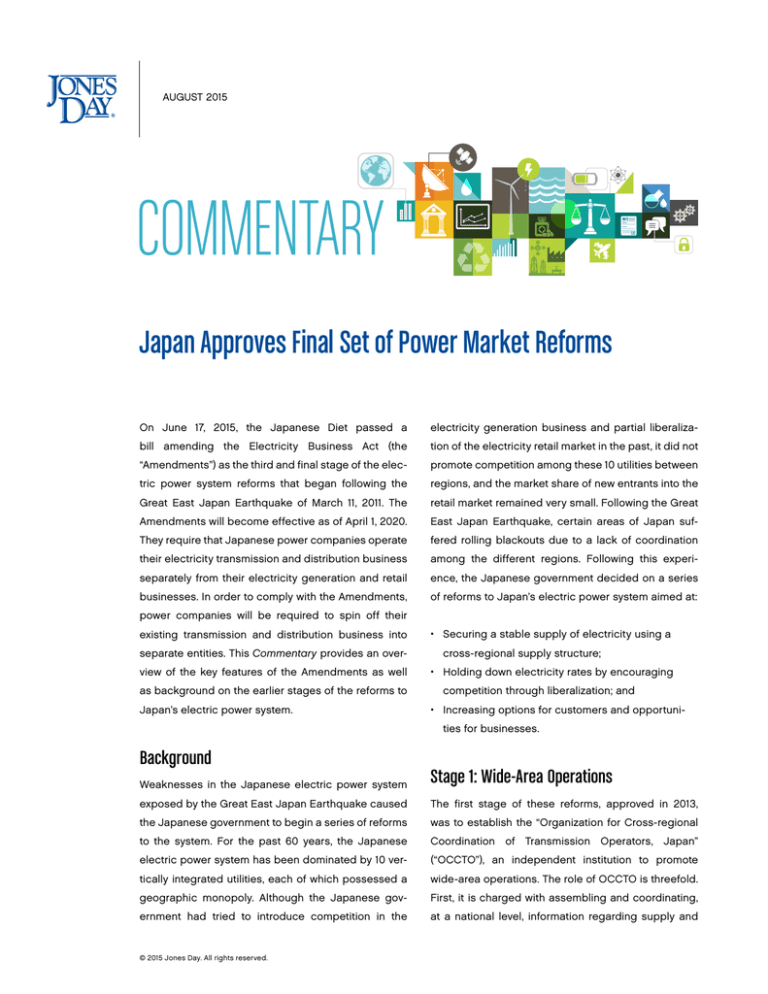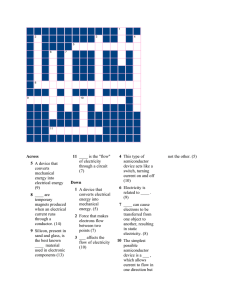
AUGUST 2015
COMMENTARY
Japan Approves Final Set of Power Market Reforms
On June 17, 2015, the Japanese Diet passed a
electricity generation business and partial liberaliza-
bill amending the Electricity Business Act (the
tion of the electricity retail market in the past, it did not
“Amendments”) as the third and final stage of the elec-
promote competition among these 10 utilities between
tric power system reforms that began following the
regions, and the market share of new entrants into the
Great East Japan Earthquake of March 11, 2011. The
retail market remained very small. Following the Great
Amendments will become effective as of April 1, 2020.
East Japan Earthquake, certain areas of Japan suf-
They require that Japanese power companies operate
fered rolling blackouts due to a lack of coordination
their electricity transmission and distribution business
among the different regions. Following this experi-
separately from their electricity generation and retail
ence, the Japanese government decided on a series
businesses. In order to comply with the Amendments,
of reforms to Japan’s electric power system aimed at:
power companies will be required to spin off their
existing transmission and distribution business into
separate entities. This Commentary provides an overview of the key features of the Amendments as well
as background on the earlier stages of the reforms to
Japan’s electric power system.
• Securing a stable supply of electricity using a
cross-regional supply structure;
• Holding down electricity rates by encouraging
competition through liberalization; and
• Increasing options for customers and opportunities for businesses.
Background
Weaknesses in the Japanese electric power system
Stage 1: Wide-Area Operations
exposed by the Great East Japan Earthquake caused
The first stage of these reforms, approved in 2013,
the Japanese government to begin a series of reforms
was to establish the “Organization for Cross-regional
to the system. For the past 60 years, the Japanese
Coordination of Transmission Operators, Japan”
electric power system has been dominated by 10 ver-
(“OCCTO”), an independent institution to promote
tically integrated utilities, each of which possessed a
wide-area operations. The role of OCCTO is threefold.
geographic monopoly. Although the Japanese gov-
First, it is charged with assembling and coordinating,
ernment had tried to introduce competition in the
at a national level, information regarding supply and
© 2015 Jones Day. All rights reserved.
demand and the structure of the electricity market. Second,
• Increase competition by making it easier for companies
OCCTO seeks to enhance electricity transmission infrastruc-
that have newly entered the market to access the existing
ture in Japan, through such measures as increasing trans-
transmission and distribution infrastructure; and
verters and electric wires interconnected among regions.
• Achieve fairness in the interconnection and supply
Finally, in the event of a natural disaster or other emergency,
agreements.
OCCTO would adjust the supply of electricity and provide
instructions to utilities to create flexibility in the supply of
The current system in Japan heavily favors existing market
electricity. These reforms were implemented, and the OCCTO
participants. Currently, a single company may engage in (and
was established on April 1, 2015.
large electric utility companies in fact do engage in) the three
businesses—power generation, distribution, and retail—as
long as the accounts for each of these businesses are sepa-
Stage 2: Liberalization of Retail Market
rated. However, whether this accounting separation scheme is
The second stage of the reforms, approved in 2014, was
sufficient to maintain the neutrality and fairness of the electric-
to fully liberalize entry into the electricity retail business in
ity distribution/transmission business has for some time been
Japan. The second stage marked the end of the series of lib-
a subject of debate. Some argue that electric utility compa-
eralizations for entry into the electricity retail market in Japan
nies may have an incentive to favorably treat their electricity
that the Japanese government had implemented in a phased
generation and retail divisions, and may also have an incen-
manner since 2000. Prior to this second-stage reform, gen-
tive to utilize information obtained through their distribution/
eral household customers were required to purchase elec-
transmission business for promoting their other businesses.
tricity from local monopoly-holding utilities such as Tokyo
Electric Power Company, Incorporated, known as TEPCO.
The Amendments are expected to remove these types of
Accordingly, the rates that could be charged by these utili-
conflicts in order to achieve fairness with regard to con-
ties were heavily regulated. Starting on April 1, 2016, additional
nections to the distribution/transmission network, and to
entities will be allowed to supply electricity to general house-
weaken these vertically integrated monopolies by prohib-
holds in order to promote competition in the electricity retail
iting a single company from operating an electricity trans-
market and to lower electricity costs.
mission and distribution business alongside an electricity
generation or retail business. Accordingly, existing utilities
As a transitional measure so that the amendment would not
will be required to spin off their transmission and distribu-
result in increased electricity retail prices due to insufficient
tion business into a separate legal entity. Importantly, the
competition, large electric utility companies are required to
Amendments require a “legal separation” method, but this is
provide retail price menus reviewed and approved by the
different from an “ownership separation.” The Amendments
Ministry of Economy, Trade and Industry (“METI”). However,
do not prohibit a company from operating these types of
they may also provide retail price menus that have been
businesses through separate subsidiaries. Therefore, power
determined without METI’s review and approval.
transmission and distribution businesses spun off by existing utilities will likely remain under the control of these
utilities as wholly owned subsidiaries.
Stage 3 Reforms
The Amendments, the third and final stage of these reforms,
were passed by the Diet on June 17, 2015. The goal of the
Conduct Control
Amendments is to neutralize the electricity distribution/trans-
In addition to requiring legal separation between the electric-
mission sector from the generation and retail sectors through
ity transmission and distribution business and the electric-
the separation of legal entities conducting these businesses,
ity generation and retail businesses, the Amendments also
with two ultimate principal purposes:
impose certain controls on conduct.
2
Jones Day Commentary
First, companies operating a transmission and distribution
(electricity generation, transmission and distribution, and
business may not have interlocking directors or officers with
retail). Prior to the Amendments, the Electricity Business Act
companies operating an electricity generation or retail busi-
granted an electric utility’s bondholders a statutory lien, giv-
ness. Specifically, the directors and officers of a company
ing them priority over other unsecured creditors. Under the
operating a transmission and distribution business, including
Amendments, this grant of a statutory lien will be repealed,
its affiliates, may not be a director, officer, or employee of a
and bondholders will rank in priority equal to other unse-
company operating an electricity generation or retail busi-
cured creditors.
ness, including its affiliates.
tion business are prohibited from entering into certain types
Effect on Existing Contracts under the Feed-in
Tariff System
of agreements with affiliates that operate an electricity retail
The spin-off of existing transmission and distribution busi-
business. These prohibited agreements include agreements
nesses described above will require that existing contracts
that contain terms that are nonstandard, or otherwise indi-
under the feed-in tariff system (under the Act on Special
cate that the agreement was not negotiated at arms’ length,
Measures Concerning the Procurement of Renewable Energy
and agreements that may limit fair competition.
by Operators of Electric Utilities) be restructured. Under this
Second, companies that operate a transmission and distribu-
system, certain power generation facilities that generate elecFinally, the transmission and distribution companies must
tricity using renewable energy have entered into long-term
adopt an internal control system to ensure compliance with
power purchase agreements and transmission agreements
these conduct control regulations.
with the existing utilities. The spin-off of the transmission
business will require that the rights and obligations under the
interconnection and transmission agreements be transferred
Retail Price Regulations
to the spun-off business. The rights and obligations under
The Amendments will also allow METI to selectively exempt
the power purchase agreements will be held by the retail
companies from electricity rate regulations. As discussed
business company.
above, customers were permitted to choose the company from
which they purchase electricity as part of the Stage 2 reforms to
the electric power system. METI, however, could still review and
Conclusion
regulate the prices and services offered by these companies.
The Amendments will become effective as of April 1, 2020,
to allow an adequate period of time for adopting additional
The Amendments will amend these transitional measures
rules and systems for the stable supply of electricity. When
starting April 1, 2020 or later, after confirmation of the prog-
fully implemented, these reforms have the potential to funda-
ress of the electricity market’s competitive status, and the
mentally transform the Japanese electricity market, increase
Japanese government will designate the companies to which
competition, and provide business opportunities to new
the price regulations do not apply. This revision will allow
entrants to the market. These reforms may also create new
METI to exempt companies meeting certain criteria from rate
market opportunities for companies that provide analytical
regulations. Specifically, METI will exempt companies from
and logistical services to those in the energy industry, and
rate regulations if it determines that the exemption would not
also for foreign investors. However, Japan’s electricity mar-
harm the company’s customers.
ket is in a period of great transition, and the development
of the electricity system is currently in progress. Investors
should fully understand the legal framework and associated
Repeal of Bondholder Preference
risks before they decide to enter the market. Finally, if effec-
Finally, the Amendments will repeal the provisions of the
tive, these reforms should create essential flexibility to the
Electricity Business Act that give preference to bondholders
Japanese electric power system that will allow it to withstand
of electric utilities engaged in all three types of businesses
future natural disasters or other emergencies.
3
Jones Day Commentary
Lawyer Contacts
For further information, please contact your principal Firm
representative or one of the lawyers listed below. General
email messages may be sent using our “Contact Us” form,
which can be found at www.jonesday.com/contactus/.
Hirokazu Ina
Tokyo
+81.3.6800.1836
hina@jonesday.com
Kaoru Umino
Tokyo
+81.3.6744.1616
kumino@jonesday.com
John Rudd
Tokyo
+81.3.6800.1809
jrudd@jonesday.com
Naoko Tokumoto
Tokyo
+81.3.6800.1877
ntokumoto@jonesday.com
Jones Day publications should not be construed as legal advice on any specific facts or circumstances. The contents are intended for general information purposes only and may not be quoted or referred to in any other publication or proceeding without the prior written consent of the Firm, to be
given or withheld at our discretion. To request reprint permission for any of our publications, please use our “Contact Us” form, which can be found
on our website at www.jonesday.com. The mailing of this publication is not intended to create, and receipt of it does not constitute, an attorney-client
relationship. The views set forth herein are the personal views of the authors and do not necessarily reflect those of the Firm.



